EVENTS & SEMINARS
2025
AgriGenomics Annual Retreat
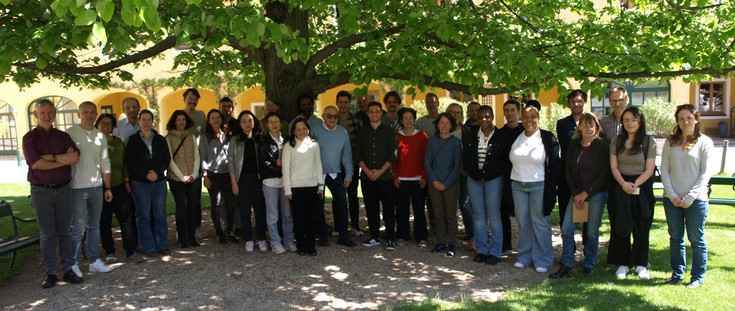
OLYMPUS DIGITAL CAMERA
2024
AgriGenomics Annual Retreat
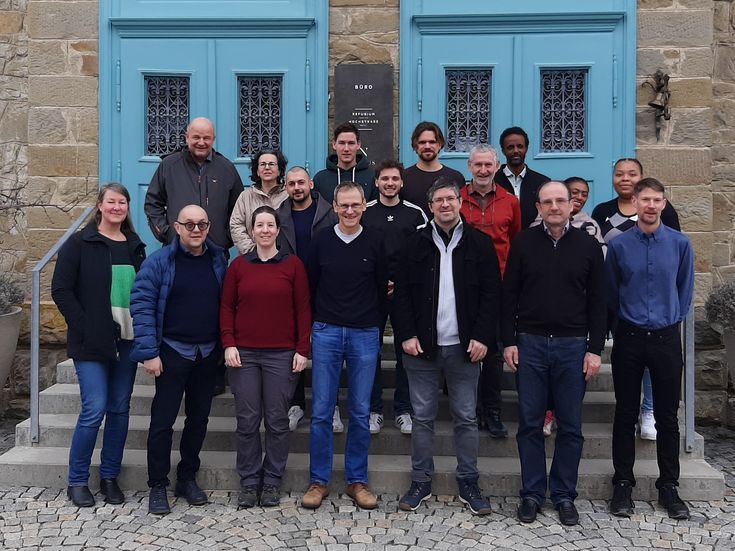
2023
AgriGenomics Annual Retreat
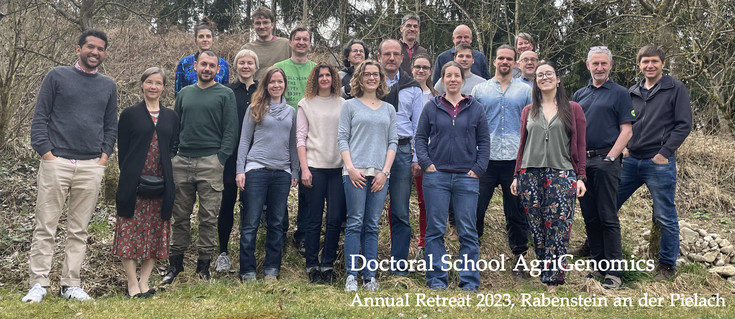
The 2023 retreat took place February 22-24, at Steinschalerhof in Rabenstein an der Pielach, in the so called “Drindl-Valley”. Dirndl is the local name for Cornelian cherry dogwood (Cornus mas) which is a traditional and popular fruit tree in this region, with beautiful yellow flowers in early spring and read cherry-like fruits in autumn.
We are grateful to Prof. Jochen Reif (IPK Gatersleben) and Prof. Ino Curik (University of Zagreb) for joining us as external advisors and sharing their expertise with us.
We explored with different communication settings including regular presentation talks, chalk talks and a test-defensio. We also found it very inspiring to discuss each project in a world-cafe setting in small groups.
And it was great fun to learn more about Cornus mas, beavers in the Pielach valley, and during an evening quiz.
Ino Curik
The AgriGenomics retreat in February 2023 was excellently organised and had very good accommodations. Even more important were the excellent presentations and their scientific quality. I enjoyed it very much.
AgriGenomics seminars
12.01.2023
Speaker: Antonio Di Pietro, University of Córdoba
Talk: Adaptation strategies in a clonally evolving fungal pathogen
2022
AgriGenomics seminars
01.12.2022
Speaker: Sónia Negrão, University College Dublin, Ireland
Talk: Unlocking the genetic potential of heritage barley to improve waterlogging tolerance using high-throughput phenotyping
03.11.2022
Speaker: Zachary Lewis, University of Georgia (UGA)
Talk: Assembly and function of silent chromatin in Neurospora crassa: new insights into the Polycomb Repression Network
06.10.2022
Speaker: Holger Puchta, Karlsruhe Institute of Technology (KIT)
Talk: Applying CRISPR/Cas to plants: From Gene Editing to Chromosome and Tissue Engineering
20.01.2022
Speaker: Kelly Swarts, Gregor Mendel Institut, Vienna, Austria
Talk: Tree-ring genomics for understanding responses to changing climate
AgriGenomis Annual Retreat
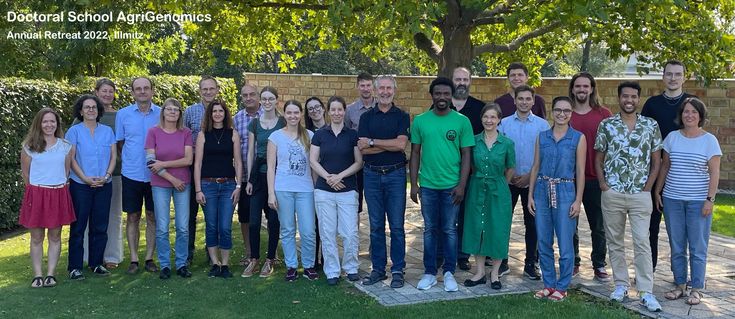
Nathaniel Street
The retreat was an excellent opportunity to meet and interact with both the PhD students and their advisors to discuss their research and wider issues such as future career plans. The retreat was well structured to include scientific presentations with feedback and discussion follow ups as well as social interaction. The retreat location and facilities were perfect to be able to focus on the retreat activities away from daily work. One thing I particularly values were the discussions after the presentations.
2021
AgriGenomics seminars
16.12.2021
Speaker: Matteo Dell’Acqua, Scuola Superiore Sant’Anna (SSSA), Pisa, Italy
Talk: Data-driven, genomics-enabled participatory methods to support breeding for challenging cropping environments: the case of durum wheat in Ethiopia
11.11.2021
Speaker: Sanu Arora, John Innes Centre Norwich, UK
Talk: Improving plant health for sustainable agriculture
21.10.2021
Speaker: Jochen Christoph Reif, IPK Gatersleben, Germany
Talk: Innovations driving the improvement of crops
17.06.2021
Speaker: Peter F. Stadler, University of Leipzig, Germany
Talk: Reconstructing Transcripts Accurately: Complex Loci and the Evolution of long non-coding RNAs
22.04.2021
Speaker: Matthew D. Clark Research Leader Department of Lifesciences, Natural History Museum, UK
Talk: Combining genome technologies with genetics to analyse MAGIC populations
25.02.2021
Speaker: Mitch McGrath, Michigan State University, USA
Talk: Sugar beet genomics in the breeding age
21.01.2021
Speaker: Ric de Vos, Wageningen University and Research Centre, The Netherlands
Talk: Metabolomics: a versatile tool in agro-genomic research
08.01.2021
Speaker: Gaud Dervilly, Laboratoire d’Etude des Résidus et Contaminants dans les Aliments, Nantes, France
Talk: Metabolomics in chemical risk analysis
AgriGenomis Annual Retreat
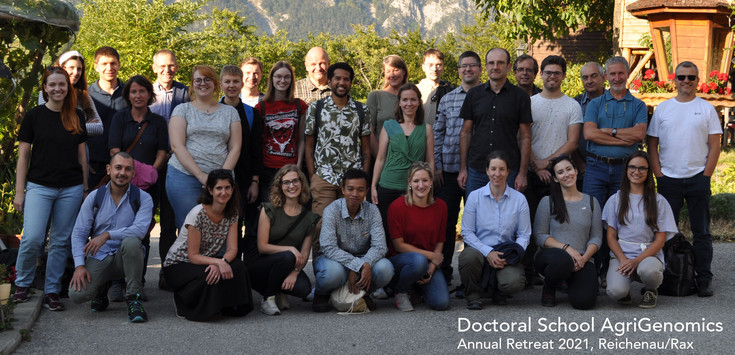
Isolated from the distractions of everyday administrative life, project leaders and PhD students of the interdisciplinary BOKU Doc-School AgriGenomics finally met again "live" for their annual retreat. In the tranquil ambience of the turn-of-the-century styled "Hotel Marienhof" in Reichenau an der Rax, students from six departments spent two days presenting project progress and discussing ideas, problems and future plans in detail. Typical "Agri": the excursion to the Alpaca farm including discussions about pedigree, husbandry and breeding. And a (supposedly calming) Alpaca walk into the surrounding forests.

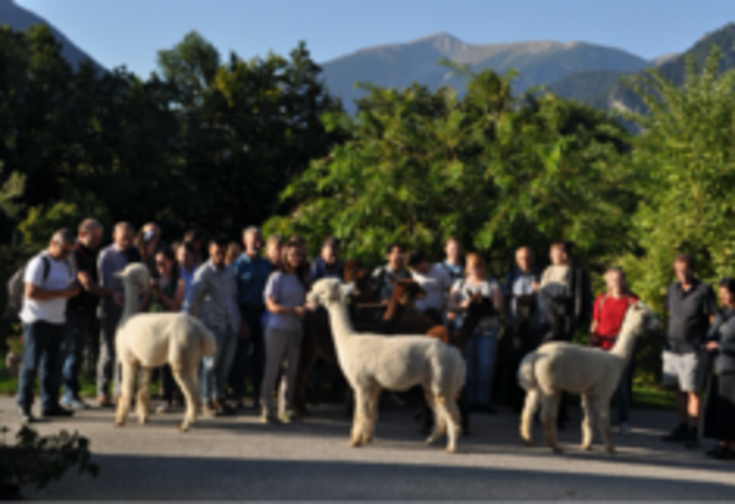
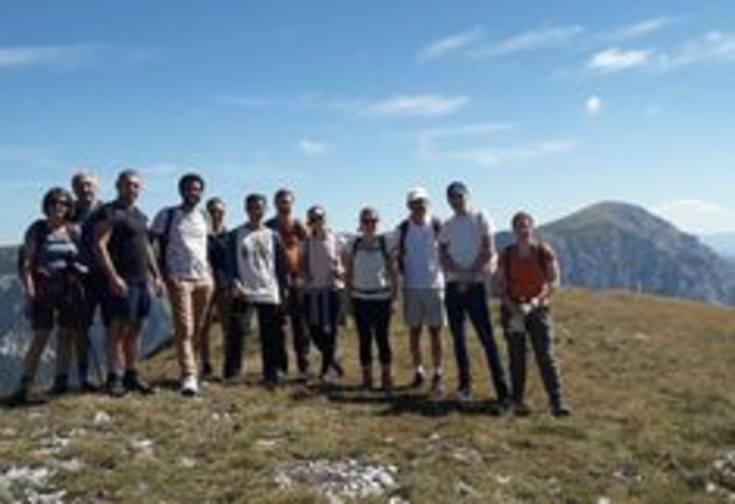
Impressions of PhD students from the AgriGenomics DocSchool-Retreat 2021
After a time of online seminars, virtual conferences and countless Zoom-meetings, the first “post-COVID” AgriGenomics retreat was taking place in physical presence in an atmosphere of excitement, elation and long-desired personal reunion. As the DocSchool is approaching its second birthday, the number of students but also of the PIs attending the retreat had considerably increased compared to the first event. Therefore, especially the first day was an entertaining mixture of listening to scientific presentations of PhD-projects and trying to get to know as many new people as possible while also catching up on the stories of “old” colleagues. The highly interdisciplinary AgriGenomics DocSchool unites students and PIs of quite diverse research groups, always challenging its members to leave their own scientific comfort-zone and get involved with topics in the broader context of genomics in agricultural sciences. That this challenge was readily accepted could be seen in the lively discussions following individual presentations, sometimes in turn challenging the tight time schedule.
Nevertheless, the whole group managed to be on time for an excursion to some very peculiar, very adorable and also very stubborn subjects of agricultural business: the so-called Rax-Alpakas at the farm of Doris and Mario Siwatz. By producing strange sounds and being incredibly fluffy, these animals quickly made their way into the hearts of most AgriGenomics-people during a short stroll near the farm. It seemed that conversations flowed even more easily across the woolly backs of stubborn Alpakas not really willing to walk the same way as their human guides. In consequence, chats about everything from journal publications to research stays, favorite recipes or film recommendations kept going on all through the visit at a “Most-Heurigen”, dinner and far into the night.
Students presenting on the second day of the retreat were probably a little afraid that they would struggle to compete with all these nice memories created the day before – fortunately, both students and PIs were still open to explore even more aspects of the four AgriGenomics pillars bioinformatics/statistics, diversity and selection, functional genomics as well as epi-, meta- and proteomics. The afternoon-discussions within both the student- and PI-group clearly showed that the DocSchool is full of enthusiastic people aiming to become an even better-connected interdisciplinary group and ready to embark on new tasks. One of these will be to adequately celebrate several anniversaries in the coming year: 150 years of BOKU, the 200th birthday of genetics pioneer Gregor Mendel and 3 years of AgriGenomics doctoral school!
With such good prospects, the official part of the 2nd AgriGenomics retreat in Reichenau an der Rax had come to an end. While some made their way home, several students and PIs extended the experience even a little longer: led by AgriGenomics-coordinator Hermann Bürstmayr, 15 members of the DocSchool invested an extra day to explore the beautiful Viennese Alps with a hike to the “Ameisbühel”. Climbing steep slopes and walking across pastoral plains near the mountain top, the AgriGenomics-group transformed into a sports team, passing roughly 1100 meters of altitude and being rewarded with cold drinks and fresh food at a mountain farm and of course a magnificent view from the peak of the “Ameisbühel”. This can be seen as a metaphore for the DocSchool: we tackle challenges as a group, help and motivate each other and manage to see things from a different perspective to successfully achieve our goals. Many thanks to everyone who helped making this experience possible, especially Christa Jakopitsch from the DocService and our coordinator Hermann Bürstmayr!
2020
AgriGenomics seminars
11.12.2020
Speaker: Coral Barbas, San Pablo CEU University, Madrid, Spain
Talk: Unveiling metabolic changes affecting the brain slices used for electrophysiological recordings through a multiplatform metabolomics approach
19.11.2020
Speaker: Wolfram Weckwerth, University of Vienna, Austria
Talk: From Metabolomics to biochemical network modelling for the characterization of germplasm collections
18.06.2020
Speaker: Hans Lenstra, Utrecht University
Talk: Molecular tools and analytical approaches for the characterization of farm animal genetic diversity
14.05.2020
Speaker: Tosso Leeb, University of Bern, Switzerland
Talk: Genomic solutions for Mendelian traits
30.04.2020
Speaker: Hermann Schwarzenbacher, ZuchtData GmbH, Vienna, Austria
Talk: Cattle breeding in Austria using genomic selection
16.01.2020
Speaker: Marc-Henri Leburn, INRAE, Université Paris-Saclay, France
Talk: The use of transposon mutagenesis and engineering in genetic analysis of the wheat pathogen Zymoseptoria tritici
AgriGenomics Annual Retreat
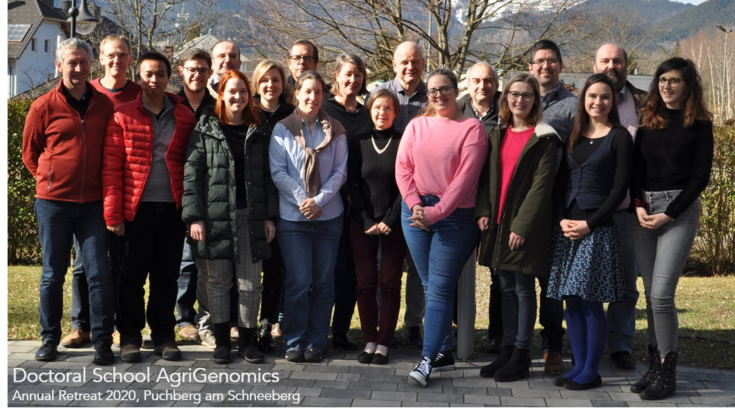
The first AgriGenomics Annual Retreat was held from February 19-20 in Hotel Schneeberghof in Lower Austria. All doctoral candidates gave oral presentations, introducing their doctoral project to all AgriGenomics members. In addition, poster sessions were held to increase the individual feedbacks for studens. Importantly, discussion rounds with the doctoral candidates were held to shape the DocSchool according to their needs.
As a social activity team ice curling was organized to intensify personal contacts and to allow for more informal discussions between faculty and students.
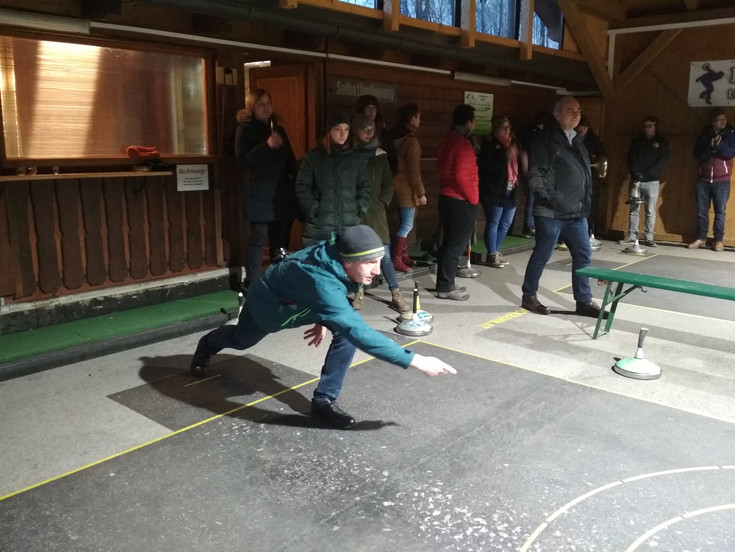
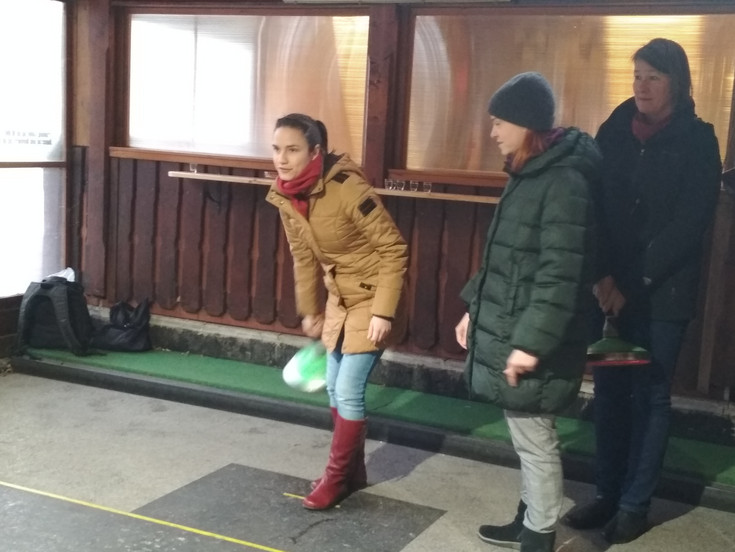
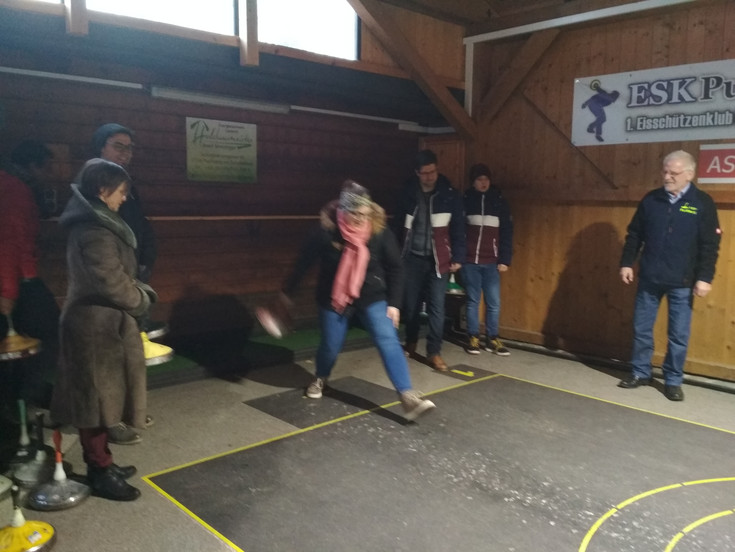
2019
AgriGenomics seminars
12.12.2019
Speaker: Klaus Mayer, Technical University Munich, Germany
Talk: The genomes of human civilisation(s)
